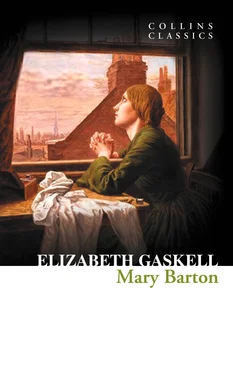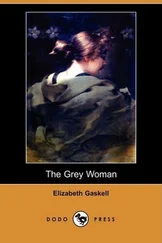I do not know whether it was on a holiday granted by the masters, or a holiday seized in right of Nature and her beautiful spring time by the workmen, but one afternoon (now ten or a dozen years ago) these fields were much thronged. It was an early May evening – the April of the poets; for heavy showers had fallen all the morning, and the round, soft, white clouds which were blown by a west wind over the dark blue sky, were sometimes varied by one blacker and more threatening. The softness of the day tempted forth the young green leaves, which almost visibly fluttered into life; and the willows, which that morning had only a brown reflection in the water below, were now of that tender grey-green which blends so delicately with the spring harmony of colours.
Groups of merry and somewhat loud-talking girls, whose ages might range from twelve to twenty, came by with a buoyant step. They were most of them factory girls, and wore the usual out-of-doors dress of that particular class of maidens; namely, a shawl, which at midday or in fine weather was allowed to be merely a shawl, but towards evening, or if the day were chilly, became a sort of Spanish mantilla or Scotch plaid, and was brought over the head and hung loosely down, or was pinned under the chin in no unpicturesque fashion.
Their faces were not remarkable for beauty; indeed, they were below the average, with one or two exceptions; they had dark hair, neatly and classically arranged dark eyes, but sallow complexions and irregular features. The only thing to strike a passer-by was an acuteness and intelligence of countenance, which has often been noticed in a manufacturing population.
There were also numbers of boys, or rather young men, rambling among these fields, ready to bandy jokes with any one, and particularly ready to enter into conversation with the girls, who, however, held themselves aloof, not in a shy, but rather in an independent way, assuming an indifferent manner to the noisy wit or obstreperous compliments of the lads. Here and there came a sober quiet couple, either whispering lovers, or husband and wife, as the case might be; and if the latter, they were seldom unencumbered by an infant, carried for the most part by the father, while occasionally even three or four little toddlers had been carried or dragged thus far, in order that the whole family might enjoy the delicious May afternoon together.
Some time in the course of that afternoon, two working men met with friendly greeting at the stile so often named. One was a thorough specimen of a Manchester man; born of factory workers, and himself bred up in youth, and living in manhood, among the mills. He was below the middle size and slightly made; there was almost a stunted look about him; and his wan, colourless face, gave you the idea, that in his childhood he had suffered from the scanty living consequent upon bad times, and improvident habits. His features were strongly marked, though not irregular, and their expression was extreme earnestness; resolute either for good or evil, a sort of latent stern enthusiasm. At the time of which I write, the good predominated over the bad in the countenance, and he was one from whom a stranger would have asked a favour with tolerable faith that it would be granted. He was accompanied by his wife, who might, without exaggeration, have been called a lovely woman, although now her face was swollen with crying, and often hidden behind her apron. She had the fresh beauty of the agricultural districts; and somewhat of the deficiency of sense in her countenance, which is likewise characteristic of the rural inhabitants in comparison with the natives of the manufacturing towns. She was far advanced in pregnancy, which perhaps occasioned the overpowering and hysterical nature of her grief. The friend whom they met was more handsome and less sensible-looking than the man I have just described; he seemed hearty and hopeful, and although his age was greater, yet there was far more of youth’s buoyancy in his appearance. He was tenderly carrying a baby in arms, while his wife, a delicate fragile-looking woman, limping in her gait, bore another of the same age; little, feeble twins, inheriting the frail appearance of their mother.
The last-mentioned man was the first to speak, while a sudden look of sympathy dimmed his gladsome face. ‘Well, John, how goes it with you?’ and in a lower voice, he added, ‘Any news of Esther yet?’ Meanwhile the wives greeted each other like old friends, the soft and plaintive voice of the mother of the twins seeming to call forth only fresh sobs from Mrs Barton.
‘Come, women,’ said John Barton, ‘you’ve both walked far enough. My Mary expects to have her bed in three weeks; and as for you, Mrs Wilson, you know you are but a cranky sort of a body at the best of times.’ This was said so kindly, that no offence could be taken. ‘Sit you down here; the grass is well nigh dry by this time; and you’re neither of you nesh *folk about taking cold. Stay,’ he added, with some tenderness, ‘here’s my pocket-handkerchief to spread under you to save the gowns women always think so much on; and now, Mrs Wilson, give me the baby, I may as well carry him, while you talk and comfort my wife; poor thing, she takes on sadly about Esther.’
These arrangements were soon completed; the two women sat down on the blue cotton handkerchiefs of their husbands, and the latter, each carrying a baby, set off for a further walk; but as soon as Barton had turned his back upon his wife, his countenance fell back into an expression of gloom.
‘Then you’ve heard nothing of Esther, poor lass?’ asked Wilson.
‘No, nor shan’t, as I take it. My mind is, she’s gone off with somebody. My wife frets and thinks she’s drowned herself, but I tell her, folks don’t care to put on their best clothes to drown themselves; and Mrs Bradshaw where she lodged, you know, says the last time she set eyes on her was last Tuesday, when she came downstairs, dressed in her Sunday gown, and with a new ribbon in her bonnet, and gloves on her hands, like the lady she was so fond of thinking herself.’
‘She was as pretty a creature as ever the sun shone on.’
‘Ay, she was a farrantly *lass; more’s the pity now,’ added Barton, with a sigh. ‘You see them Buckinghamshire people as comes to work here has quite a different look with them to us Manchester folk. You’ll not see among the Manchester wenches such fresh rosy cheeks, or such black lashes to grey eyes (making them look like black), as my wife and Esther had. I never seed two such pretty women for sisters; never. Not but what beauty is a sad snare. Here was Esther so puffed up, that there was no holding her in. Her spirit was always up, if I spoke ever so little in the way of advice to her; my wife spoiled her, it is true, for you see she was so much older than Esther, she was more like a mother to her, doing everything for her.’
‘I wonder she ever left you,’ observed his friend.
‘That’s the worst of factory work for girls. They can earn so much when work is plenty, that they can maintain themselves anyhow. My Mary shall never work in a factory, that I’m determined on. You see Esther spent her money in dress, thinking to set off her pretty face; and got to come home so late at night, that at last I told her my mind; my missis thinks I spoke crossly, but I meant right, for I loved Esther, if it was only for Mary’s sake. Says I, “Esther, I see what you’ll end at with your artificials, and your fly-away veils, and stopping out when honest women are in their beds; you’ll be a street-walker, Esther, and then, don’t you go to think I’ll have you darken my door, though my wife is your sister.” So says she, “Don’t trouble yourself, John, I’ll pack up and be off now, for I’ll never stay to hear myself called as you call me.” She flushed up like a turkey-cock, and I thought fire would come out of her eyes; but when she saw Mary cry (for Mary can’t abide words in a house), she went and kissed her, and said she was not so bad as I thought her. So we talked more friendly, for as I said, I liked the lass well enough, and her pretty looks, and her cheery ways. But she said (and at that time I thought there was sense in what she said) we should be much better friends if she went into lodgings, and only came to see us now and then.’
Читать дальше












